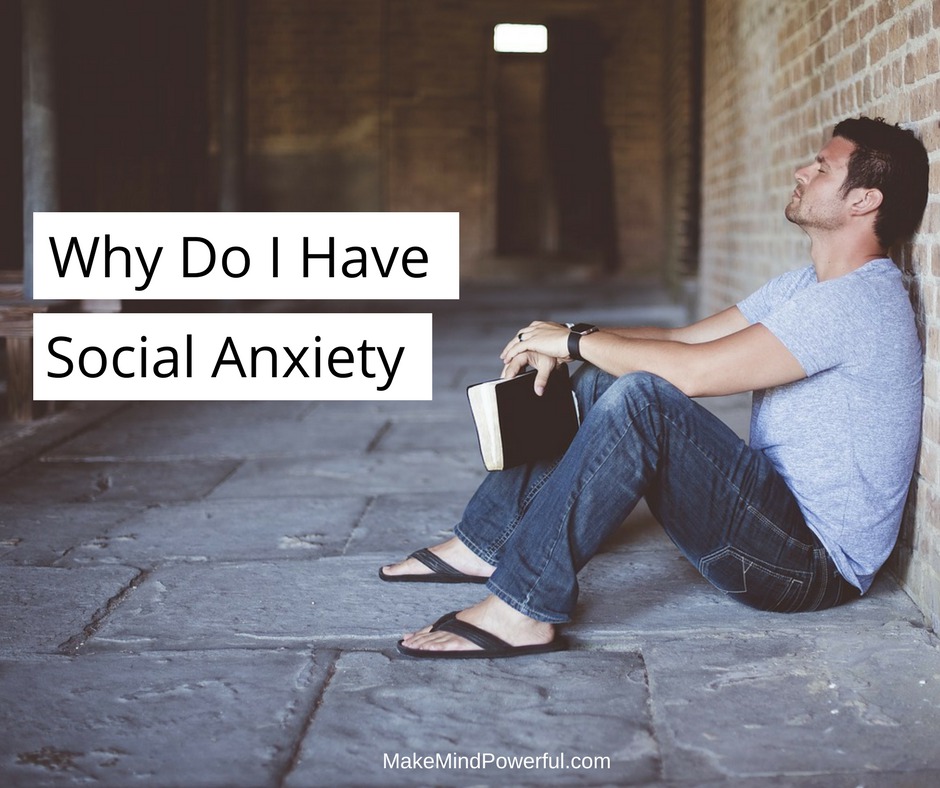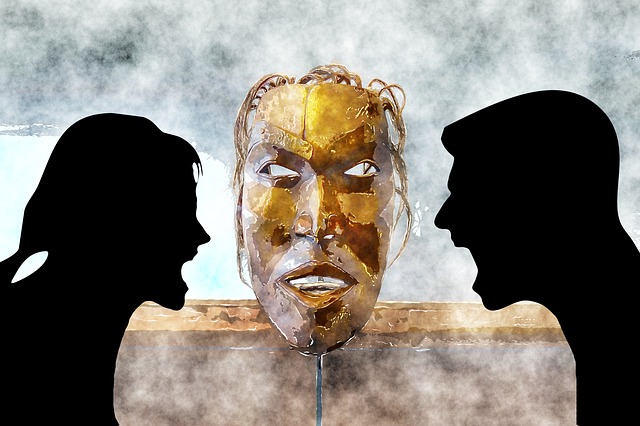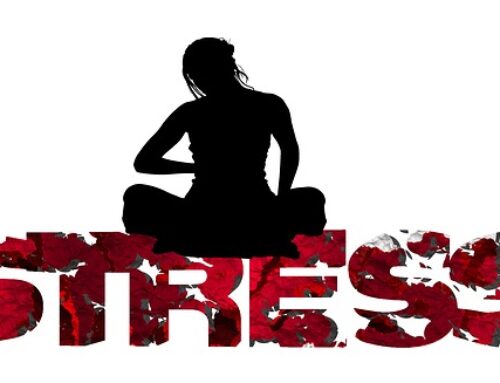You toughen up yourself to turn up for the after work party for the first time in 3 years, as your teammate pestered you into it. You’re pretty sure you are boring to start with, and wonder how you could stop yourself from blushing from talking to your top superiors. Five minutes before the party, you decided to disappoint your team and you find yourself rushing your way back home.
You hated yourself for the low self-esteem. If only you could talk freely without feeling like everyone is staring at you. But have you ever asked, “why do I have social anxiety”? Or does it even matter?
Recommended: How To Deal With Social Anxiety Effectively
If this scenario seems familiar to you, then it’s very likely you’re suffering from social anxiety disorder. It affects around 6.8% of the population in America. I believe the numbers wouldn’t differ much from the rest of the world. But what’s more shocking is that 36% of them only seek help after struggling for more than 10 years.
I’ll be part of the statistic if I’m an American. Except that I never seek professional help, and I have mistaken symptoms of social anxiety as introversion until a couple of years ago. Since then, I’ve often pondered what causes social anxiety disorder? It may help in dealing with relapses. And I wanted to make sure my child could avoid the struggles I’ve gone through with social anxiety. Here’s the list.
9 Possible Causes Of Social Anxiety That You May Identify With
1. Genetic
Published on March 9, 2017, researchers at Institute of Human Genetics at the University Of Boston found that one’s probability to develop social anxiety disorder is strongly linked to a specific serotonin transporter gene (SLC6A4). The study involves 321 patients with social anxiety disorder and 801 controls.
2. Sexual Abuse
Sexual abuse, especially those suffered in childhood, does leave a deep negative trauma that could carry on in our subconscious mind. The victims could not express or shed off the sense of shame that accompanies the incident.This could cause social anxiety to develop, along with other avoidance behaviors. Greg Weber of HealthyPlace spoke of his experience of his struggles.
3. Public Humiliation
In an educational system where students are taught not to make mistake, one could easily get criticized and publicly humiliated by classmates and teacher alike in a non-ideal learning environment. This naturally discourages one to try further and would rather retreat into his or her comfortable and safe shell. Could you relate to this?
4. Bullying
Bullying can be very traumatizing experience and it’s a vicious cycle that can be hard to break, as neither fighting back nor staying away could really keep of bullies effectively. And it doesn’t need to be physical. Verbal and emotional abuses could just as well cause someone to develop avoidance behaviors that will affect their normal life. Katie, a victim of bullying recounts her experience here.
5. Isolation From Society
What you don’t use will deteriorate in time, or never develops at all. That includes your social skill. If you’re being cut off from the society for a long time, you’ll find it incredibly nerve-wracking to engage in a conversation with a stranger. Isolation could be crippling if you already have social anxiety. I can personally testify for this as one of the primary causes of my recent relapse.
6. Misguided Beliefs
What we heard and tell ourselves in our childhood or teenage years could form a powerful subconscious belief that causes social anxiety disorder later on in life. Are you made to believe that
“You’re not good enough to go on stage“, “your presentation sucks“, or “you have awful presentation skill“? It’s easy to assume that you can easily brush these comments off but sometimes they remain in your subconscious mind and trigger anxiety each time you’re presented with certain situations.
7. Family Conflict
When you’re a child and could not understand why adults quarrel, it can be distressing. You’ll adopt behaviors that you hope would create different results for yourself in the future. Or sometimes you feel that you’re to blame for the conflict but that’s not true. It may push you to avoid conflict at all cost to the extent that you may assume that less interaction is better.
8. Parenting Styles
Parents are naturally protective but in certain Eastern culture, they can be overprotective at all times. Children become less tolerant to stress. And when you grew up in environments where kidnapping and child trafficking happens, you’ll be told by well-meaning parents to “avoid talking to strangers“. Unfortunately, this could sometimes develop into avoidance behavior later on in life.
9. Traumatic Social Experience
Sometimes you just made a major blunder in your presentation that has the rest of the audience laughing in your face. Or perhaps a date that goes horribly wrong because you said the wrong thing at the wrong time. Some people react by laughing it off, while some would be heavily affected by the experience. Does similar experience affect you?
Is It Important To Understand The Causes Of Social Anxiety?
Yes. Knowing what actually causes our social anxiety could help us respond differently when we are faced with the same scenario again. For example, I’ve been sort of isolated from society for some time being a full time working from home single dad.
Having conversation through emails and online chats can’t really substitute real life conversation. To an extent, it could cause my social anxiety to relapse, if I do not handle it carefully.
Understanding the causes could help us prevent the similar struggles in our children. At the very least, we can cultivate good parenting style that will enforce our children with the confidence they need to socialize. We can’t change the fact of our struggles but we could avoid the same thing happening to others.
Can You Overcome Social Anxiety Without Getting To The Root Causes?
Does getting down to the causes of your social anxiety brings you any closer to beating it? Or at least getting it under control? This is where some would greatly disagree with me.
I don’t think that getting to the root cause will be critical in overcoming social anxiety. Some of the events happened years or decades ago. Those events causes affect our brain and change our behavior. Call it a chemical imbalance or subconscious thoughts. The fact is these avoidance behaviors are enforced each time we backed out from social triggers.
My experience with social anxiety starts in my teenage years and lasted for as long as 15 years. I never asked myself why do I have social anxiety as I struggled through those years. I merely thought that I’m an awkwardly shy introvert, only to realize later in life what I was going through. Click here to read my full story.
The bottom line is, there are many therapies and remedies available that could change the avoidance behavior that you thought you have to live with for life. I don’t believe that anything is permanent as long as we have the determination to follow through. And that includes beating social anxiety.
Learn How This Hypnosis Calm My Social Phobia Almost Instantly
What do you think causes your social anxiety? How do you manage or overcome it? Share your stories in the comment below.
Related :
Hypnosis For Social Anxiety – Overcome Social Phobia Review
15 Lifestyles And Natural Remedies For Social Anxiety I Personally Tried
How Social Anxiety Is Slowly Killing Off Your Relationship
Why Self-Isolation Traps You In A Vicious Cycle Of Social Anxiety
9 Psychological Social Anxiety Disorder Symptoms You May Confuse For Introversion







I think what cause me a social anxiety is mostly misguided beliefs, I often tell myself that I didn’t good enough about my appearance, work performance, my grade, everything. I often beat myself up about every little thing and overthinking a lot.
How I manage it is to realize that doing that things to myself isn’t gonna help. What I did is knowing that I’m good enough and I did my best at things. I used to want things to be perfect, now I know that I should strive for progress not perfection. Stop comparing myself to others and focusing on be better than I was yesterday 🙂
Hi Diana,
You’re definitely doing the right thing by stop comparing yourself to others. It’s one key step to overcoming social anxiety.
Cheers,
Kenny
Very interesting read. I, myself, have often wondered if I struggle a bit with social anxiety. It’s interesting to see where this might have come from – possible misguided beliefs in my case.
We are so good at putting ourselves down and constantly reminding ourselves that we aren’t good enough. It’s easy to see how that could turn into social anxiety and not wanting to go out into a crowd of people where you feel you might be “judged.”
Hi,
Sometimes we can be easily influenced to believe that we’re just not good enough. And that can get into us and causes avoidance behavior.
Thanks for reading.
Cheers,
Kenny
I have several of these. I even believe my mother (now 83) has social anxiety worse than I do. I’m not sure knowing why helps prevent it. Particularly if it is genetic as I suspect.
Hi Amy,
I guess if it’s being genetic is hard to prevent. Thanks for your comment.
Kenny